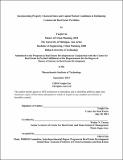Incorporating property characteristics and capital market conditions in optimizing commercial real estate portfolios
Author(s)
Liu, Yanjia
DownloadFull printable version (4.142Mb)
Other Contributors
Massachusetts Institute of Technology. Center for Real Estate. Program in Real Estate Development.
Advisor
Walter N. Torous.
Terms of use
Metadata
Show full item recordAbstract
We all know for diversification purposes we cannot "put all our eggs in one basket." Markowitz's Modern Portfolio Theory leads us to diversify our portfolio to achieve the highest Sharp ratio. Fama-French's Three-Factor Model links the asset's characteristics to the risk-return profile and further advances the portfolio theory. However, in practice, due to uncertainty and lack of data, none of those theories gets implemented in a way that can help construct a complex portfolio and generate portfolio optimization strategies. Especially for the Commercial Real Estate Industry, investors face challenges in long-term data collection and a tremendous amount of data processing. In 2009, Michael W. Brandt, Pedro Santa-Clara, and Rossen Valkanov explored a new approach that fundamentally improves the portfolio optimization methodology. They modeled the portfolio weight in each asset as a function of the asset's characteristics and the associated capital market conditions. The coefficients of this function are found by optimizing the investor's average utility of the portfolio's return over the sample period. This approach is computationally simple, and can be easily modified to include more asset characteristics and capital market variables. In a later study, Alberto Plazzi, Walter Torous, and Rossen Valkanov applied Brandt, Santa-Clara, and Valkanov's methodology to optimize commercial real estate portfolios, and explored several techniques in commercial real estate portfolio management. This thesis follows Plazzi, Torous and Valkanov's research framework, applies the methodology to a specific real estate investment fund, and proposes several innovations to further explore the application of this theory in real estate fund management. First, I propose to rebalance the portfolio annually because real estate transactions are less frequent compared with other types of assets, such as stocks or bonds. Second, I construct sub-portfolios by property type and region because the sub-portfolio optimization can provide practical suggestions to specific asset managers in charge of a specific type of property or a specific region. Finally, I include capital market indicators, such as the Chicago Fed National Activity Index and Liquidity Metrics. These innovations use academic research to inform practice, thus providing asset managers practical suggestions to guide wealth allocation across different commercial properties, and to take advantage of movements in expected returns arising from the changing macroeconomic conditions.
Description
Thesis: S.M. in Real Estate Development, Massachusetts Institute of Technology, Program in Real Estate Development in conjunction with the Center for Real Estate, 2014. This electronic version was submitted by the student author. The certified thesis is available in the Institute Archives and Special Collections. Cataloged from student-submitted PDF version of thesis. Includes bibliographical references (pages 50-51).
Date issued
2014Department
Massachusetts Institute of Technology. Center for Real Estate. Program in Real Estate Development.; Massachusetts Institute of Technology. Center for Real EstatePublisher
Massachusetts Institute of Technology
Keywords
Center for Real Estate. Program in Real Estate Development.